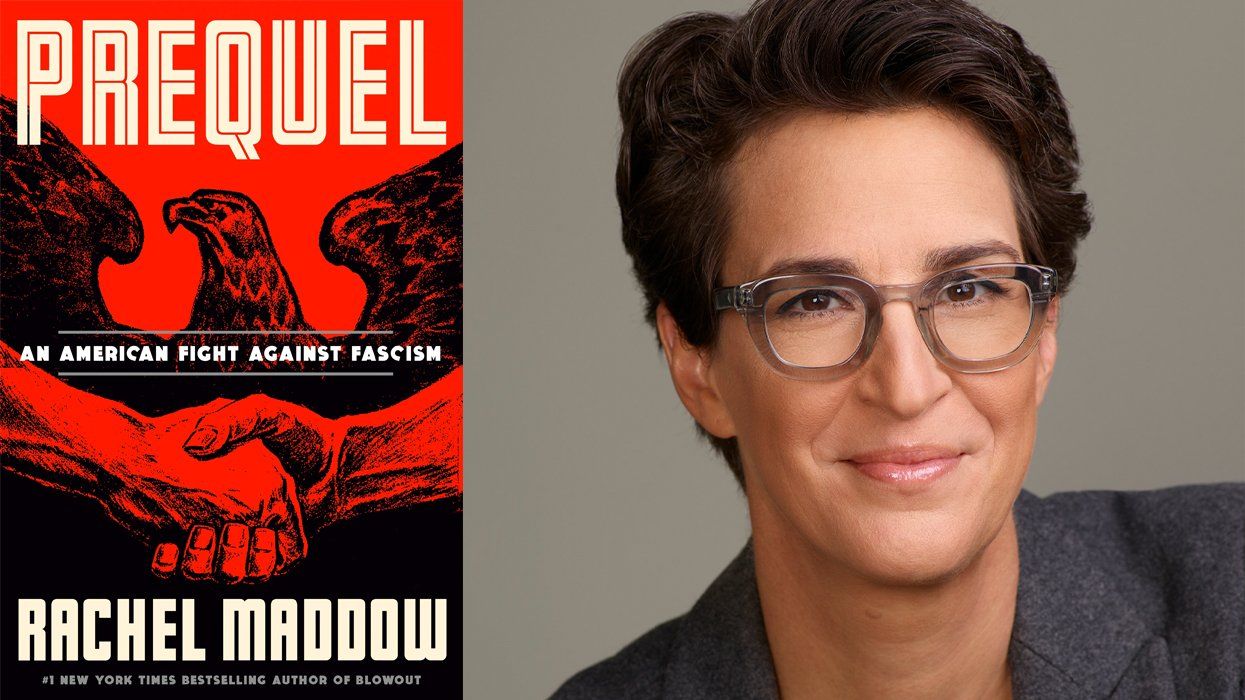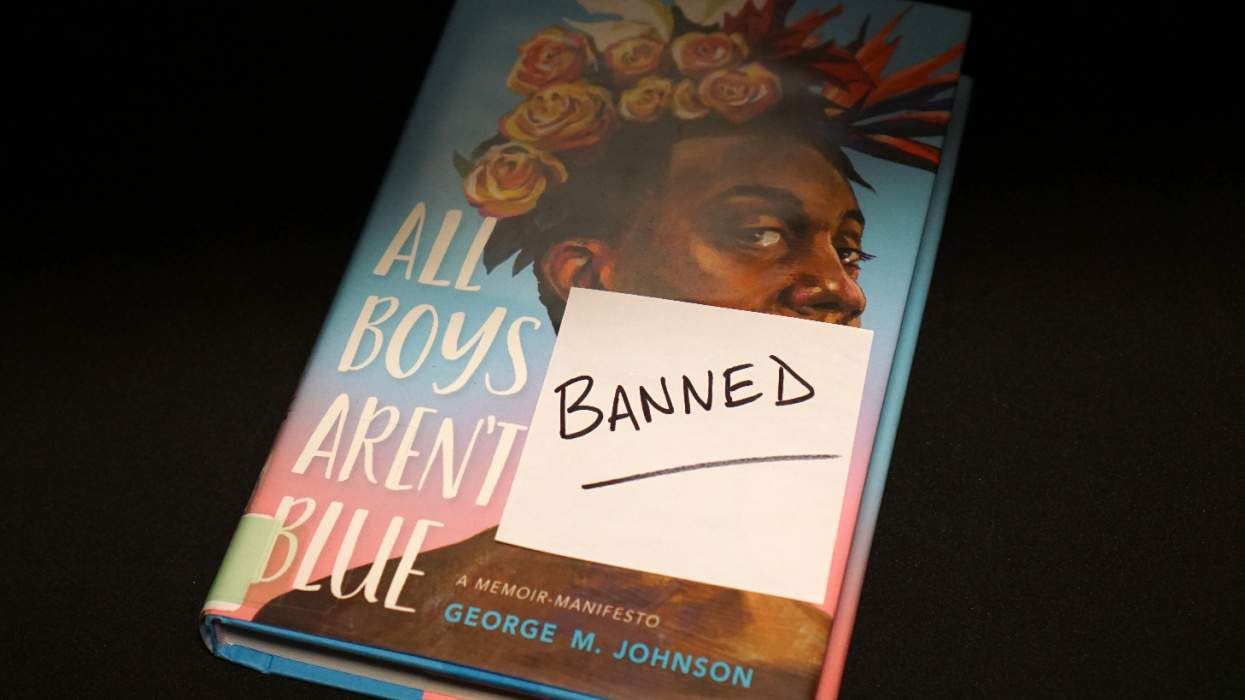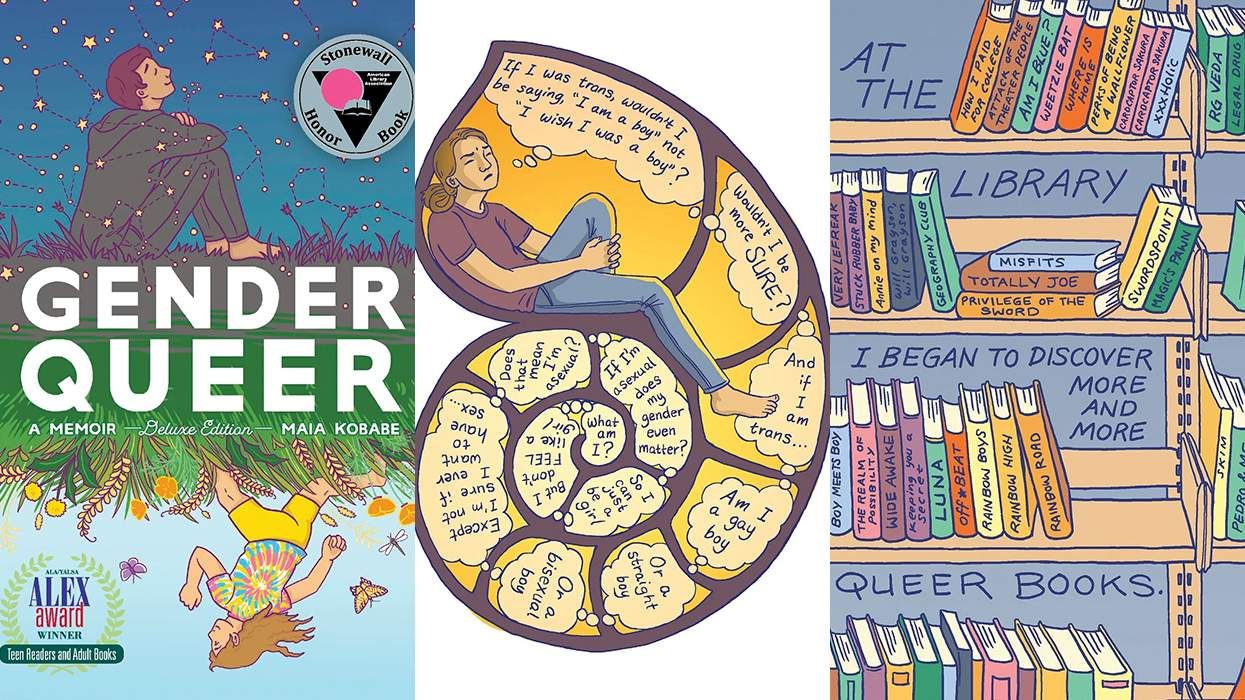In a time of political unrest as the country prepares for another election, Rachel Maddow’s new book, Prequel: An American Fight Against Fascism, provides a lens through which to view the contemporary American political landscape.
Maddow, 50, known for her unique storytelling ability on her wildly popular eponymous MSNBC show, now in its 15th year, delved into the resonances between past and present-day extremist movements in the U.S. during a recent conversation with The Advocate.
Her book, which stemmed from a mountain of research Maddow conducted for her podcast, Ultra, serves as a reminder of nefarious chapters in America’s history and the heroic people who prevented the worst, subtly drawing parallels with extremist ideologies ascendant today, especially those targeting marginalized communities, including people of color, women, and the LGBTQ+ community.
Diving into the history of fascism in America
Maddow said she became interested in the story because the daily news cycle presents questions about why things are the way they are.
“With this one, I was like, ‘Why are we having this version of the political right in America ascendant?'” she said. “At the same time, we’re having this bizarre resurgence of Holocaust denial and wild, lurid anti-Semitism. Why is that coming up now? Is there any connection to what’s going on in our political moment? And so I was trying to figure out, ‘OK, well, what’s the history of Holocaust denial in the United States? Where does that come from?”
Prequel transports readers back to a crucial yet lesser-known period on the edges of World War II when American fascists who sympathized with and lionized Adolf Hitler and the Nazis aimed to establish an American Reich.
The book traces the efforts of various paramilitary factions like the Christian Front, Silver Legion, and American White Guard. Their goal was to unleash domestic terror, creating chaos that would provide a pretext for fascists to seize power. Notable personalities, such as architect Philip Johnson, scouted for an American version of Hitler, favoring Louisiana's Huey Long, a governor of the state and then a U.S. senator. Maddow’s research reveals the chilling intentions of these factions.
During the 1930s, these figures found support among powerful allies. Hundreds of New York City cops joined the Christian Front, while secretly, members of the National Guard conspired to acquire weapons for the radical extremists.
A chapter in the book discusses a Nazi rally, complete with swastikas and Nazi salutes, in Madison Square Garden.
Maddow unveils the disturbing alliances between isolationist members of Congress and fascist ideologues, underlining the extent to which Nazi propaganda found its way into American households.
The story includes several trials that end up falling apart, including a case where a shocking development ends the trial when the judge dies.
The broad support network for authoritarian ideologies is a stark reminder of how fragile democracy can be amid a well-organized extremist movement.
When extremists meet
Maddow commented on the peculiar alliances against marginalized groups to The Advocate.
Reflecting on recent developments where neo-Nazis have publicly united against transgender people and demonstrated in Ohio, Florida, and Wisconsin, where they were protesting against drag queens alongside evangelical Christians and the far-right group Gays Against Groomers, Maddow noted the making of strange bedfellows. “How can all these totally disparate groups who you think would hate each other be on the same side of this issue?” she asked.
Then she explained, “It’s because it’s not an alliance of people who see themselves as compatriots. It is an alliance of people who are all using the same tactic, and the tactic works for all of them. And even though they’re very disparate and they’re coming from different places, and the hypocrisy of them working with each other feels absolutely stultifying to us, to them, it all makes sense.”
Maddow acknowledged the multifaceted nature of this issue, noting that societal resilience is built through an iterative process of breaking and mending. She outlined four indicators that signal a democracy at risk from authoritarian tendencies: “scapegoating of a minority,” “incursion of violence into what counts as the political sphere,” “an assault on truth,” and the “withering functioning of democracy.”
She delved into the alarming trend of violence seeping into the political realm. Maddow pointed out this is a “real red flag” in the current political climate. Undermining faith in voting through intimidation, gerrymandering, or political parties failing to deliver on their promises is detrimental to a free society, she said.
“What that does is that divorces people from the idea that we’re in this together as citizens, and we make decisions collectively,” she noted. The tactic of blaming a minority for societal problems feeds the undermining of democratic processes, she said.
Moreover, Maddow spotlighted the assault on truth, with the public deterred from trusting journalism, experts, and science, leading to an overreliance on a single leader for the "truth." The right-wing attack on science during the height of the COVID-19 pandemic fits into the broader history of assaulting truth, making democracy vulnerable to authoritarian tendencies, she said.
Maddow cautioned, “You need people to be told that you can’t believe journalism. You can’t believe experts; you can’t believe science. There is no knowable truth. Just count on your leader to do it.”
This assault impedes the public’s ability to separate facts from misinformation, a strategy often employed by authoritarian regimes to consolidate power.
What can Prequel tell us about the present
Prequel contributes significantly to the understanding of authoritarian tendencies and how self-proclaimed patriots can turn against democracy. The book underscores the recurring challenges faced by democratic societies, urging collective vigilance to safeguard democratic values against the insidious infiltration of extremist ideologies.
Asked about the contemporary scenario in which a former president, indicted on more than 90 charges, has been attacking the judiciary, Maddow acknowledged the concern, emphasizing that such tactics operate on multiple levels. She illustrated a scenario where a country ceases to decide things by voting, leading to a strongman seizing and holding power by force, rendering democratic institutions like Congress and the judicial system obsolete.
Drawing a parallel to Russia after Vladimir Putin’s ascent to power in 1999, she highlighted how the Duma, the national legislative body, lost its significance, emphasizing that once strongman rule is established, there’s no room for competing governance elements.
Discussing the legal system’s role under a strongman’s rule, she said, “You use it to advance the strongman’s aims.” About former President Donald Trump’s legal woes as he tries to run for another term, Maddow said that it’s essential to watch what is being done instead of what is being said. She warned of the media’s propensity to engage in “both sides” journalism when one side is pushing for the end of democracy.
“Asking for the mob to respond to the legal predicament that he is in — one of the many legal predicaments that he’s in — and his party in Congress is throwing the speaker of the House out, which shuts down the House of Representatives, and then they go away for five days because eventually, they’ll get around to picking a new one, but maybe not. That’s what’s happening. That’s what they’re doing in one party. Meanwhile, the other party — what did Joe Biden do within the same period of time? He reduced prescription drug prices, he canceled some student loan debt, and he organized five of our allies or four of our allies to put out a five-country statement of unity in support of our ally Israel, who has suffered this incredible terrorist attack.”
Maddow added, “This is not just a party in power and a party not in power. These are two political organizations with different plans and projects that are working on different things, so don’t compare them on the basis of their plans for light rail in the Chicago area. There’s no reason to do that. It’s like asking a fish and a bear, what’s for dinner? Yeah, you’re both animals, but one of these animals is going to eat the other!”
How not to repeat the far-right past
She stressed the importance of remembering the historical missteps in Prequel to ensure they do not recur, emphasizing, “That ought to be way more famous than it is, and we ought to be really, really, really on alert that those same dynamics don’t work to derail the Justice Department now.”
Maddow also highlighted the self-interest driving attempts to delegitimize and intimidate the justice system, again urging the necessity of learning from history to prevent a repeat. “It’s, I think, helpful to see that this isn’t the first go-round on this particular carousel,” she said.
Maddow said that in the current moment, when politics are so polarized and right-wing extremists have been gaining legitimacy and a voice in mainstream politics, the challenges can seem daunting.
“It’s like the sliders on a soundboard; they go up and go down and go up, but right now, when they’re all up, we’re in a spot that’s very vulnerable to somebody coming in and saying, 'OK, what do you want this democracy for anyway? 'I’m offering something better. I’m offering you something that’ll give you what you really want, and it’s me!'” she said.
But, Maddow explains, that's exactly what America is up against.
"That’s what we’re fighting," she said. "And so for me, it is, I know it sounds dire, but for me, knowing that, being able to articulate it, being able to recognize that this is not the first time we’ve had to fight it is heartening and grounding in terms of really facing squarely what we’ve got to contend with in saving the country.”
















Charlie Kirk DID say stoning gay people was the 'perfect law' — and these other heinous quotes
These are some of his worst comments about LGBTQ+ people made by Charlie Kirk.